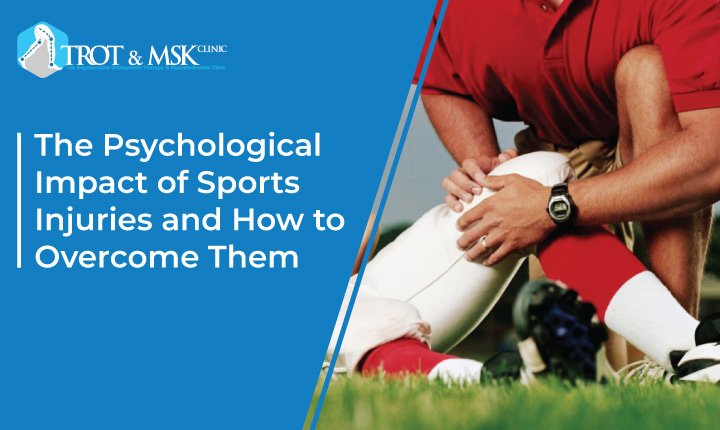For athletes, whether professional or recreational, sports injuries are more than just a physical setback; they are a mental and emotional challenge. Beyond the pain of the injury itself lies a more profound struggle that can affect an athlete’s confidence, motivation, and sense of identity. This psychological toll can be as debilitating as the injury, but understanding these impacts and finding ways to address them can pave the path to recovery.
Understanding the Psychological Impact of Sports Injuries
When athletes are sidelined due to injury, they often experience a range of emotional responses. The initial reaction may include shock, denial, or anger, as the realization of being unable to participate in their sport sets in. For many, this is followed by feelings of frustration and sadness as they confront the uncertainty of recovery and the possibility of losing their hard-earned fitness or competitive edge. One of the most significant psychological impacts is a sense of loss. Sports are often a core part of an athlete’s identity. Being injured can lead to feelings of isolation, as the individual is unable to train or compete alongside teammates. The lack of routine and purpose can sometimes result in anxiety or even depression. Another common issue is the fear of re-injury. This fear can linger long after the body has physically healed, potentially affecting performance and confidence. Athletes may also struggle with the pressure to return to their sport as quickly as possible, sometimes at the expense of proper rehabilitation.
The Role of Dr. Shohab Hyder Shaikh in Sports Injury Recovery
Dr. Shohab Hyder Shaikh, a British-trained Trauma and Orthopedic Surgeon in Karachi, understands that sports injuries demand a comprehensive recovery approach that addresses both physical and psychological challenges and also Provides Sports Injury Surgeries in Karachi. With his expertise in regenerative therapies, minimally invasive surgeries, and arthroscopic procedures, Dr. Shohab not only helps patients regain their physical health but also empowers them to rebuild their mental resilience. Dr. Shohab specializes in cutting-edge treatments such as Regenerative Therapy and Knee Replacement Surgery, which aid in faster healing of ligament and tendon injuries. By combining these innovative therapies with personalized rehabilitation plans, he ensures that athletes receive the best care for a quicker and more confident return to their sport. Moreover, his empathetic approach and emphasis on patient education help athletes understand their recovery journey, alleviating anxiety and fear.
How to Overcome the Psychological Impact of Sports Injuries
While the physical aspects of injury recovery often receive the most attention, addressing the psychological effects is equally crucial. Here are some strategies to help athletes overcome the mental challenges of sports injuries:
1. Acknowledge Your Feelings
It’s normal to feel disappointed, frustrated, or even angry after an injury. Allow yourself to process these emotions rather than suppressing them. Sharing your feelings with trusted friends, family, or teammates can help lighten the burden.
2. Seek Professional Support
Working with a sports psychologist or counselor can provide tools to manage stress, set realistic recovery goals, and rebuild confidence. These professionals specialize in helping athletes navigate the emotional complexities of injury recovery.
3. Stay Connected with Your Sport
Even if you can’t actively participate, staying engaged with your team or sport can help maintain a sense of connection and purpose. Attend games, support teammates, or learn more about the strategic aspects of the game to stay mentally sharp.
4. Set Small, Achievable Goals
Recovery can feel overwhelming, but breaking it into smaller milestones can help you stay motivated. Celebrate every step forward, whether it’s regaining a range of motion, walking without pain, or returning to light training.
5. Practice Visualization Techniques
Imagining yourself successfully returning to your sport can be a powerful mental tool. Visualization helps reinforce positive outcomes and can reduce fear of reinjury, making you feel more prepared when the time comes.
6. Focus on What You Can Control
During recovery, some aspects are beyond your control, such as the timeline for healing. Instead, focus on what you can influence, like adhering to your rehabilitation plan, maintaining a healthy diet, and staying mentally active.
7. Leverage Innovative Medical Solutions
Advances in regenerative medicine and minimally invasive procedures can significantly enhance recovery. Dr. Shohab Hyder Shaikh’s expertise in these areas ensures athletes receive state-of-the-art care, reducing recovery times and boosting confidence.
Turning Setbacks into Comebacks
While challenging, a sports injury can also be an opportunity for growth. Many athletes emerge from recovery stronger—both physically and mentally. By addressing the psychological effects of injury, setting realistic goals, and relying on a team of trusted professionals like Dr. Shohab, athletes can transform setbacks into comebacks.








